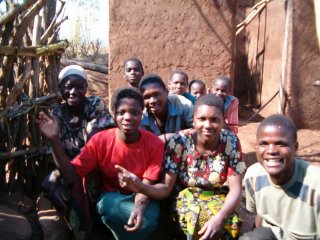Part Three: August 4

The Piggery Youth Group in Dedza - Front of Photo L-R: Selina Saires (17), Konsolada Charles (17),David Saires (19) Chifundo Chikoko (19) Frank Baulen (21)
Friday, and I’m off to Dedza, a rural area just over an hour’s drive from Lilongwe. My first glimpse of rural Africa is unforgettable. Catherine, Relief and Rehabilitation Coordinator from Cadecom who implement Trócaire’s Integrated Rehabilitation Programme, arrives in Lilongwe shortly before eight and we head out reaching a stark, dry, bleached landscape of hills and mud and daub houses with thatched roofs like nothing I’ve seen before. Catherine, who has a magnificent Afro incidentally, worked as a teacher and then as a physical planner with the government before joining Cadecom. As we drive to Dedza, we see the odd patch of irrigated green jumping out of this brown landscape. While I admire the view, Catherine points out the level of deforestation here, which has caused soil erosion problems, damaging the fertility of the soil and contributing to the food security problems. She notes that Malawians are obsessed with Maize, a crop that has not served them well; their climate does not suit it. It needs more rain and better soils than Malawi can provide but the people are very attached to it. Catherine stresses the importance of persuading Malawians to move away from their reliance on Maize.
At the Cadecom Dedza offices we pick up Sprian, who is a Cadecom Agricultural field supervisor and I grab enough material for an interview with Sprian and Catherine at the start and end of the day. In between we drive around Magunditsa , Luweya, Kapesi, and Mchengawedi meeting people who have benefited from Trócaire’s programme. Catherine keeps apologising about the bumpy country roads which aren’t bothering me at all; she’s an excellent driver and the four wheeler truck has fine suspension plus I’m too busy trying to stop my jaw dropping at what seems like a whole different world to me. Children run out of their homes to wave and smile at us. In Magundita, we arrive at Ruth Kamkwale’s home to talk to her about her vegetable garden; a swarm of kids crowd around the vehicle, the youngest ones shouting Mzungu (white man). Catherine is worried that I might be offended but of course I’m delighted to be called a Mzungu for the first time ever and start laughing. I guess it probably loses its novelty after a while.
The people here are so friendly but one feels a bit awkward in that some almost pay you too much respect because you’re from Trócaire and Catherine introduces me in Chichewa by saying this man is from Trocaire, the people that give us the money (!). I spend a lot of time saying Zikomo (thanks in Chichewa) to compensate and asking Catherine to tell people I am grateful for their time. In Kapesi, Agnes and the other members of the Chicken group there teach me how to say ndiri bwino (I am fine) when they say muli bwanji ? (how are you?) and they all laugh with me (or at me?) when I try to say it. In Mchengawedi, walking over the ridges in a vegetable garden to take a photo, I slip and send soil flying. I’m horrified and think the people are going to get mad at me for wrecking their garden but they just start laughing at me too. In Luweya, I meet a fantastic bunch of young people who are members of a youth group that have been breeding pigs and providing home-based care in the community. I interview Frank who leads the way for the group as his English is quite good. Towards the end of the day I’m tiring and fail to get a useable shot of Elizabeth Boko who received a goat as part of Trócaire’s global gift scheme. As my batteries and the batteries on my digital camera run out and it starts to turn dark we head back for a late lunch/dinner at the Dedza pottery and café shop. Catherine and Sprian have been brilliant and as I head back to Lilongwe. I feel I’ve learnt a lot from them and in Dedza today. It has been an amazing experience for me personally and is the highlight of the whole trip.


<< Home